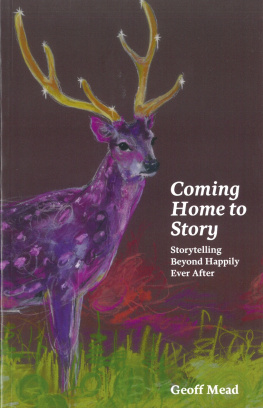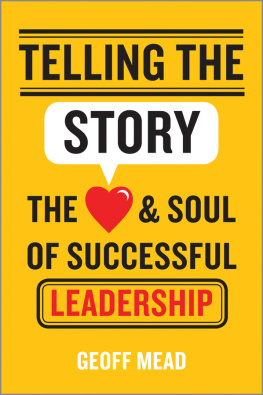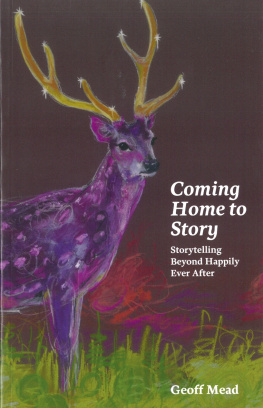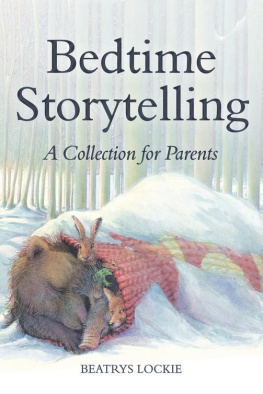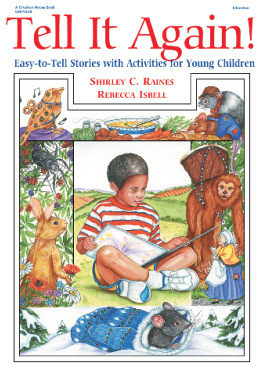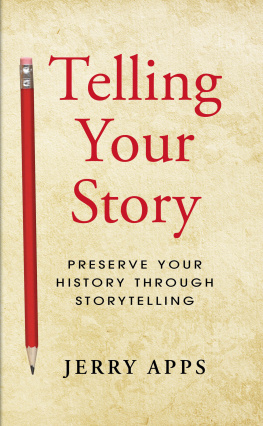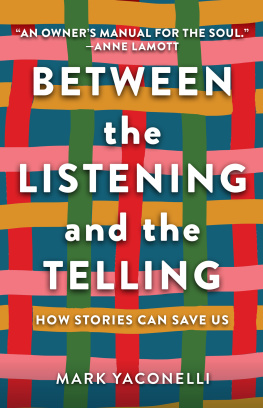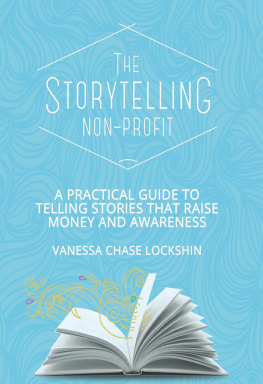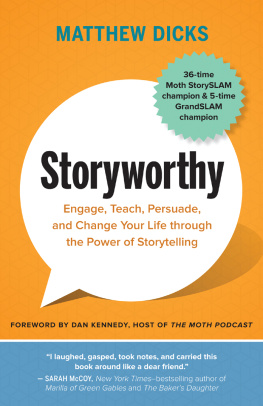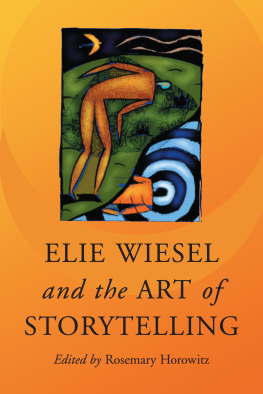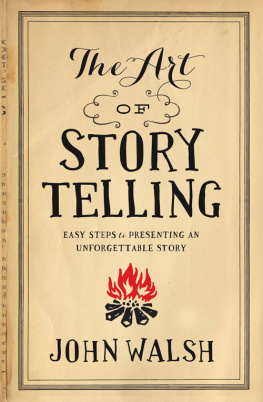
Coming Home to Story
Storytelling Beyond Happily Ever After
Geoff Mead

Jessica Kingsley Publishers
London and Philadelphia
Contents
Frontispiece
The old storytellers were the first real explorers and frontierspeople of the abyss. They brought the world within our souls. They made living within and without as one. And I think now, in our age, in the mid-ocean of our days, with certainties collapsing about us and with the dark descending nights ahead - I think that now we need those fictional old bards and fearless storytellers, those seers. We need their magic, their courage, their love and their fire more than ever before. It is precisely in a fractured, broken age that we need mystery and a reawakened sense of wonder. We need them in order to be whole again. We need to be reminded of the primeval terror again. We need to be humble again. We need to go down to the bottom, to the depths of the heart and start to live all over again as we have never lived before.
A Way of Being Free, Ben Okri
Prologue
Swimming in the Sea of Stories
Like the proverbial fish that cannot see the water they swim in, we do not notice the medium we dwell within. Unaware that our stories are stories, we experience them as the world.
David Loy

Prologue
Swimming in the Sea of Stories
We humans are storytelling creatures. We spend most of our waking lives exchanging stories and anecdotes - at home, at work, at play. Telling stories is the primary way we make sense of our experience and give significance to our lives. Childrens fables and fairy stories that end happily ever after may represent a popular conception of storytelling but they are only one facet of a universal human phenomenon.
Storytelling is enjoying a tremendous renaissance in many fields: entertainment, personal therapy, academic inquiry, business coaching and leadership development to name but a few. Books that theorise about story are plentiful, books that offer storytelling tips and techniques are relatively common but little if anything has been written that takes the reader inside the experience of telling and listening to stories.
Coming Home to Story explores the territory beyond happily ever after, drawing on my own experiences of being and becoming a professional adult storyteller to show (as well as tell) you how stories and storytelling can engage our imaginations, heal our wounded souls, bring people together in community, enable us to make sense of the world around us, and bring adventure and passion into our lives.
These may sound like rather grand claims. The most I can hope to do is to shed a little light on these areas by holding up the lantern of what I have learned during the past decade and a half as I have mastered the practicalities, stumbled into the pitfalls and reached for the potential of storytelling to take us into other worlds so that we may experience our own more deeply. Coming Home to Story both tells the story and offers the fruits of that personal odyssey. It is for anyone who has ever listened to or told a story (or wanted to) and anyone who has ever found and followed their calling or who, like me, has waited a long time to discover what it is.
For most of my first five decades, I had a nagging sense that I was living somebody elses life - a life that did not belong to me. As an adult, I was apparently successful in my chosen career (working my way up through the ranks of the police service to become a chief superintendent) with a PhD and a thriving sideline as a part-time academic and consultant. None of these superficial achievements brought much joy and I had little sense of them serving a deeper purpose. At fifty, it seemed either that I had missed my calling or that I was destined not to have one.
I was wrong. The call came late but when it did come it was loud and clear. It turns out that my calling was - and is - to be a storyteller. After several years during which my passion for stories and storytelling had steadily grown, the realisation that storytelling would become my profession came suddenly and dramatically. Afterwards I could no longer resist the siren call of my vocation.
It is 8.00 a.m. Thursday 4 th August 2005 and I am sitting on a hard wooden chair in the Speech and Drama Hut (or Screech and Trauma Hut as it is sometimes affectionately known) at Emerson College. Eight or nine other people are similarly seated on chairs scattered randomly around the room.
The dream matrix is open, says Ashley.
Twelve of us, all storytellers trained at Emerson, have assembled for a weeklong reunion. We have been learning about the Greek muses and I am feeling despondent: how well have I been entertaining the muse? Will she keep calling if I go on ignoring her knock at the door?
In the three years since I finished the Craft of the Storyteller course (a gift I gave myself as part of a six month sabbatical when I retired from the police service) I have been busy earning a living, developing a small consultancy practice, doing far too much routine administration and far too little creative work of any kind.
I had a dream last night, I say. I was walking through a city with many tall buildings. None of them were finished and most still had cranes on top. There was no sign of any work being done or other people. In my dream I realised that I was the builder and it was depressing to see so many edifices not brought to completion. Then I felt the ground shake and rumble and suddenly a waterspout, like a dozen express trains strapped together, burst out through the top of one of the buildings and shot up into the sky before the water returned to earth in a huge fountain. The ground carried on shaking and the buildings began to crumble and fall. Floodwaters rose up and swept through the streets. I could only move in one direction - with the water.
We have gathered to share dreams and dream fragments from the night before. We do not comment on the dreams, just speak them out if we are moved to do so and listen silently to others. Sometimes the dreams feel significant, sometimes not. This one stays with me and I reflect on it during the day.
Something has to change. It is quite clear to me that the muse (often associated with wells and springs) is calling me to commit to my own creative impulse and immerse myself in story. What I have done so far is all well and good but I am coming up to 56 years old and what do I have to show for my life but a city of half-completed buildings. I know that storytelling is my passion and my gift. The question is what am I going to do about it? I resolve that evening that I will change the pattern of my work and of my life. The next day as the course closes I declare to the group that I am going to dedicate myself to story and storytelling in all that I do and that somehow I will create the conditions that enable me to live my dream.
The trouble was that I wasnt sure what I needed to do . Life carried on much the same for a few months. Then in December my partner took me to Mousehole in Cornwall for a surprise birthday treat. She bought me a copy of The Mousehole Cat and I read it aloud to her. At the end of the story, when old Tom the fisherman and Mowzer his cat escaped the storm to find the whole village alight with candles and lanterns to bring them safely home, my voice broke and I wept.
As they came in sight of home, a strange sight met their eyes. The whole village of Mousehole was shining with light and lanterns gleamed along both arms of the harbour. For when the people of Mousehole had woken to find old Toms boat missing and a light left in his window, they knew that he had gone to find fish for them, or to perish on the deep water. All day they had watched and waited, staring out into the cloud-wracked sea, but they could see no sign of him. And when night fell, all the women went home and set candles in all their windows and every man lit his lantern and went down to the harbour walls.
Next page
